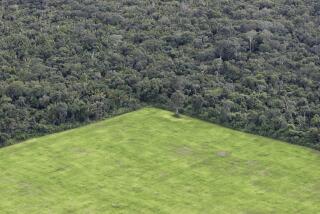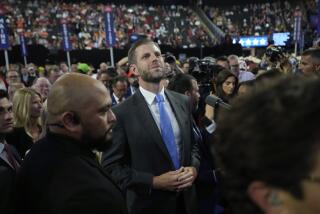Reagan, Contra Leaders Plan L.A. Meeting
- Share via
SANTA BARBARA — President Reagan, still smarting from conservative attacks on his Central America peace proposals, will meet next week in Los Angeles with Nicaraguan opposition leaders in a public show of support for the contras , the White House said Thursday.
The session, to be held on Thursday, will include talks with both the rebels’ six-member political directorate and their military commander, Enrique Bermudez, White House spokesman Marlin Fitzwater said.
Reagan met in Washington with the six political leaders only two weeks ago, on Aug. 5, when he and House Speaker Jim Wright (D-Tex.) unveiled a peace proposal for Central America, but the Los Angeles gathering will be the President’s first face-to-face meeting with the contras’ military leader.
Demonstrators Expected
The meeting, which will probably be held at the Century Plaza Hotel where Reagan stays during Los Angeles visits, appears likely to draw demonstrators on both sides of the Central American peace issue.
Fitzwater said the session will review the U.S. and contra positions on peace negotiations in the region and the state of the contra war inside Nicaragua. The contras face a cutoff of American military aid on Sept. 30.
“Make no mistake about it: We want to demonstrate to the conservative leaders and to the (contra) directorate . . . that the President will not desert the contras,” Fitzwater added.
“Part of demonstrating our commitment to the contras is to have this meeting and share with them our views, and to hear what their thinking is” on regional peace prospects, he said.
Asked how the meeting had been arranged, Fitzwater said, “I think we suggested it.” But he added that the idea for the get-together probably first arose in the course of one of the daily talks between resistance leaders and the White House.
He was also asked why contra military chief Bermudez, a former officer in the National Guard of former Nicaraguan dictator Anastasio Somoza, was asked to attend the session. He replied that Bermudez was invited to provide “an update on the military situation and where the resistance stands” in the field.
“He’s the best man to do it,” Fitzwater said.
The White House view on a Central American peace has been unclear--and has regularly come under assault--ever since prospects for a genuine end to fighting there began to take shape early this month.
Reagan has been under fire from conservatives since he gave conditional support to a preliminary peace agreement signed on Aug. 7 by the presidents of the five Central American nations. The accord sets Nov. 7 as the target date for cease-fires in the region’s guerrilla wars, including the contras’ struggle against the Sandinista regime in Nicaragua.
Four other conditions are to be met simultaneously with the cease-fires, including steps toward the implementation of democratic rights for all citizens of the region. This would include freedom of the press, of assembly and religion in Nicaragua and eventual democratic elections in that country.
Initiative From Arias
The peace plan, which overshadowed the Aug. 5 White House proposal, was based on an initiative of President Oscar Arias Sanchez of Costa Rica and signed after two days of talks in Guatemala by Arias and the presidents of Guatemala, El Salvador, Honduras and Nicaragua. It includes no specific role for the contras in talks leading toward the implementation of the accord’s provisions.
Reagan has since said that the United States will not support any settlement that is not acceptable to the contras. The White House also has made it known that it will ask Congress for new military or “humanitarian” aid for the rebels sometime after Sept. 30.
And White House officials have privately underscored their mistrust of Managua’s Marxist-led Sandinista regime, implying that a peace pact will not win U.S. backing without stronger guarantees that democratic reforms will be carried out in Nicaragua.
These gestures, however, have failed to mollify U.S. conservatives, who say that the President is deserting the rebels for a peace plan that they believe Nicaragua will not adhere to.
Moderates Angered
At the same time, Reagan has angered moderates, who view the White House statements as attempts to torpedo the peace process.
Fitzwater said Thursday that public “concerns” about the status of U.S. support for the contras helped motivate the scheduling of the session next week, at which the President will “personally give them (the contras) his assurances of his support.”
The rebel leaders will be briefed on developments since the White House peace plan was announced, Fitzwater said.
Besides military commander Bermudez, contra leaders invited to the meeting are Adolfo Calero, Alfonso Robelo, Pedro Joaquin Chamorro, Alfredo Cesar, Aristides Sanchez and Azucena Ferrey.
Assistant Secretary of State Elliott Abrams, White House Chief of Staff Howard H. Baker Jr. and Jose Sorzano, the National Security Council’s specialist on Latin American affairs, also will attend the session.
Several Events Planned
The high-profile meeting is one of several events planned by the White House for Reagan’s four-day Los Angeles visit, Fitzwater said.
Next Wednesday, the President will deliver what is billed as a major address on East-West relations to the Town Hall of California, at the Century Plaza.
The speech will be offered for broadcast to the Soviet Union and other overseas audiences, and it will be telecast live to a meeting of the Chautauqua (N.Y.) Conference on U.S.-Soviet Relations, where 200 Soviet visitors will be in attendance.
On Friday, Reagan will meet with supporters of his nominee to the Supreme Court, Robert H. Bork.
Fitzwater also confirmed Thursday that the President will go to Miami on Sept. 10 to greet Pope John Paul II as he arrives for a cross-country tour of the United States.
More to Read
Sign up for Essential California
The most important California stories and recommendations in your inbox every morning.
You may occasionally receive promotional content from the Los Angeles Times.













